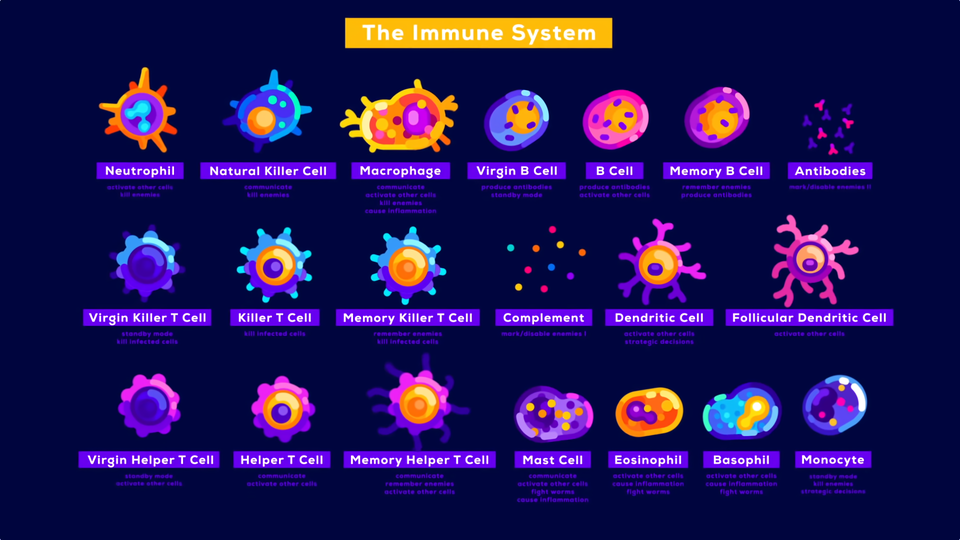BREAKING! COVID-19 Immunology: Stanford University Study Shows That SARS-CoV-2 Impairs And Dysregulates The Immune System
Source: COVID-19 Immunology Aug 12, 2020 5 years, 4 months, 1 week, 2 days, 21 hours, 52 minutes ago
COVID-19 Immunology: A new study by scientists from the School Of Medicine-Stanford University, Emory University-School of Medicine and University of Hong Kong Faculty Of Medicine identified immunological deviations and lapses that appear to highlight the difference between severe and mild cases of COVID-19.

The researchers observed that In PBMCs (Peripheral Blood Mononuclear Cells) of COVID-19 patients, there was reduced expression of HLA-DR and pro-inflammatory cytokines by myeloid cells, and impaired mTOR-signaling and IFN-α production by plasmacytoid Dendritic Cells. In contrast, there were enhanced plasma levels of inflammatory mediators, including EN-RAGE, TNFSF14, and oncostatin-M (OSM), which correlated with disease severity and increased bacterial products in human plasma. Single-cell transcriptomics revealed no type-I IFN, reduced HLA-DR in myeloid cells of severe patients, and transient expression of IFN-stimulated genes. This was consistent with bulk PBMC transcriptomics, and transient, low plasma IFN-α levels during infection.
The study findings are published in the journal: Science
https://science.sciencemag.org/content/early/2020/08/10/science.abc6261
Those identified differences originate from how our evolutionarily ancient innate immune system responds to the SARS-CoV-2 coronavirus that causes the COVID-19 disease.
Typically found in all creatures from fruit flies to humans, the innate immune system rapidly senses viruses and other pathogens. As soon as it does, it launches an immediate though somewhat indiscriminate attack on them and mobilizes more precisely targeted, but slower-to-get-moving, "sharpshooter" cells belonging to a different branch of the body's pathogen-defense forces, or the adaptive immune system.
Dr Bali Pulendran, Ph.D., Professor of Pathology and of Microbiology and Immunology and the senior author of the study told Thailand Medical News, "These study findings reveal how the immune system goes awry during SARS-CoV-2 infections, leading to severe disease, and point to potential therapeutic targets.”
The study team analyzed the immune response in 76 individual with COVID-19 and in 69 healthy individuals.
The team found enhanced levels of molecules that promote inflammation in the blood of severely ill COVID-19 patients. Three of the molecules they identified ie EN-RAGE, TNFSF14 and OSM have been shown to be associated with lung inflammation in other diseases but had not been shown previously in COVID-19 infections.
Dr Pulendran, who is the Violetta L. Horton Professor at Stanford added, "These three molecules and their receptors could represent attractive therapeutic targets in combating COVID-19."
Dr Pulendran’s lab is now testing the therapeutic potential of blocking these molecules in animal models of COVID-19.
The study team also discovered elevated levels of bacterial debris, such as bacterial DNA and cell-wall materials, in the blood of those COVID-19 patients with severe cases. The more debris, the sicker the patient and the more pro-inflammatory substanc
es circulating in the patinet’sblood.
The research findings suggest that in cases of severe COVID-19, bacterial products ordinarily present only in places such as the gut, lungs and throat may make their way into the bloodstream, kick-starting enhanced inflammation that is conveyed to all points via the circulatory system.
The study also revealed that, paradoxically, key cells of the innate immune system in the blood of COVID-19 patients became increasingly impaired as the disease got worse. Instead of being aroused by the presence of viruses or bacteria, these normally vigilant cells remained functionally sluggish.
If high blood levels of inflammation-promoting molecules set COVID-19 patients apart from those with milder cases, but it is not blood cells that are producing these molecules, rather they where do they originate in tissues somewhere in the body, most likely patients' lungs, the site of infection.
Dr Pulendran added "One of the key mysteries of COVID-19 infections has been that some individuals develop severe disease, while others seem to recover quickly. Now we have some insights into why that happens."
For more on
COVID-Immunology research and developments, keep on logging to Thailand Medical News.
